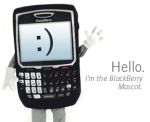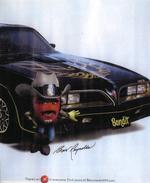For Dov Charney, who's bowing out of American Apparel in pursuit of his own manifest destiny, office life has been a source of both business and pleasure.
Short of being a lumberjack or Chuck Norris, Dov Charney is a king among men. Dov Charney:
* Masturbates regularly in front of reporters
* Gets freaky with colleagues (thanks, Jewlicious)
* Pushes American Apparel's squeaky clean clothes with skanky adverts
* Still manages to position American Apparel as an ethical business that pays good wages and poses no harm to overseas workers
While Julie Roehm fights for footstools over in Pariah-ville, she must be shaking her fist at what Dov got away with over the course of his career, also behind the guise of a similarly apple pie all-American style company.
Granted, American Apparel ain't all sex, and it isn't the first brand to use R-rated tactics to pull in a fickle demo.
Are we looking at a double standard? And double standards aside, is America just too uptight about this sex stuff?
It was only a matter of time before Wrigley's Candystand, whose candy-tagged games get progressively better, would start testing waters in real gamer territory.
Candystand and Wii just joined forces in a bizarre cross-branding where Wii web games are peddled on Candystand and Candystand is totally accessible through the Wii browser.
The relationship isn't exactly low-key - within 24 hours of launching on Wii's Internet Channel, Wii.Candystand.com drew 6000 visitors and a ton of positive reviews. That is, according to Scott Tannen, Wrigley's director of global digital marketing.
This is the first branded site to link to the Wii browser, which will definitely get competitors sniffing at the door to be next in line. Candystand's content offerings are also formatted for television instead of computer monitors.
Kudos to Wrigley for creating a series of branded offerings that seem able to stand alone in gaming world. It hasn't been an easy trek, considering Candystand was first introduced in '97 - building this kind of recognition takes time. Just ask Target.
We still harbor doubts that our Socom buddies would be deeply impressed to hear we destroy the competition on Altoids Sheep, though.
We thought the Microsoft Butterfly was kind of nifty. The guy in the BlackBerry suit? Not so much. Giant plush costumes are so deceptive in their frozen state of cheer and rarely work outside Chuck E Cheese and college football fields, where they can be ridiculed at leisure by their own peers.
The requisite BlackBerry Mascot MySpace, as if we care.
Why? Why? Why? Why do brands launch these massive campaigns, spend all this money and make ads that don't say a thing about what the company does? Are there people in agencies that still think "branding" without meaningful substance works? Apparently, not after one of those day-long, mind-numbing vision, mission, essence, position self-serving mind fucks. After that, they're all sipping the Kool Aid without realizing the consumer wasn't in that meeting all day and has no idea what the hell the resulting brand messaging is trying to convey.
Sure, this Mobius award winning Bart Domination campaign for Kaiser Permanente will certainly force the company's name into the conscious and subconscious mind of everyone within eye sight but will they walk away having any idea what the company does? Oh wait. Yea. There's this thing called the Internet. Oh wait. There's no URL in the ad. Oh wait. There's this thing called Google. It helps you find stuff. Oh wait, Kaiser's name is impossible to spell. Even if one does find their way to the site, it doesn't even tell you what the company does. Not until you click in several levels or visit the far more helpful Wikipedia listing. And yes, we have heard of Kaiser Permanente before and many people in California, where the campaign is running, have as well but that's not the case with most other marketer's that go this route.
So why? Why? Why make your potential customer work when you only have a split second of their time? Why paint pretty pictures that are devoid of commercial messaging. This isn't art. It's advertising. Wallow in the beautiful non-descriptiveness of this campaign here (PDF).
Oh, and the explanation for why those tree trunks and their copy look fake: "Apparently the photos taken of the installation were not very good and someone thought they could be improved by photoshopping the copy that was on the pillars onto the already poor quality photos."
Is it just us or has this PayPerPost thing gone to far? PayPerPost is the company that pays bloggers to write positive posts about a brand. Now the company has launched an affiliate program that promises to pay other bloggers recruit other bloggers and pay them to link to the posts written by the original PayPerPost bloggers. Let's see if we can get this straight. PayPerPost is going to pay bloggers to link to other blogger's content, for which the sole reason of its existence was cash changing hands. Is anyone else having a WTF moment about this right now? Have these PayPerPost people lost all sense of reality? There are so many things wrong with this on so many levels.
Nothing motivates like a good scare - just ask Karl Rove or mom and dad. Somebody must have tipped off the Red Cross, because based on the billboards they're posting in Buffalo, NY for campaign Prepare WNY, they're running amock with the tactic, toting arbitrary future dates (like Nov 9, 2009) as sites of terrorism.
Fortunately the zealous .org is no Oracle of Delphi. Catch Up Lady says once you get past the hype the site's pretty mundane, doling out advice on how to make survival kits and wrap gauze and such.
Everybody knows all you need to prepare for nuclear war is a pack of bacon band-aids. They don't just soothe wounds; they make you feel awesome, provide comic relief, and, once you get desperate enough, are attractive enough to eat.
As a sidenote, it's funny to us how the Red Cross of all organizations can do something so flagrantly tasteless while Cartoon Network gets penalized for a bunch of Lite Brite Mooninites. Really, what the fuck, man?
We've done stupid dads, talking animals, women in bikinis, rape, humor, shock, poignancy, cavemen, rodents out of a cannon and hundreds of other hooks to get people to look at our ads. The meme of the moment now is suicide. GM did it. VW did it. Now we have children contemplating suicide for...lollipops. Yes, Chupa Chups thinks it's the end of the world without their lollipops with girls contemplating a jump from atop a doll house and boys contemplating death by milk. Surely the Center With Nothing to do But Complain About Innocuous Ads will have something to say about this one.
A cross between a collaborative rubber band ball and a chain letter, this piece of "potential art" has been bouncing through the webosphere, inviting collective creative design for an ever-growing montage.
Drawball zooms into a spot about 1/4096th its size, which is where users can leave their mark. The result isn't just a mishmash of arbitrary graffiti; it includes americana logos like Coca-Cola, new pop culture icons like Digg and representations of various subcultures.
Like Wikipedia.org, the Drawball project proves surprising to some: people left virtually unregulated will work together to build something meaningful, even if the meaning can only be seen in the aggregate.
To witness the evolution of Drawball from beginning to end, check out Drawball Playback, where a year's work of collaborative art unfolds. It's a little like watching the progression of mankind in hyperspeed, as various image colonizations and social eclipses take place over the life of the project.
We wonder if human colonizations are this provocative from a distance. Maybe that's why God never intervenes.
Some celebrities do their thing, have their day and then quietly disappear. Not Burt Reynolds. After his Deliverance and Smokey and the Bandit days, there were his Boogie Nights days. Over 150 movie and TV appearances since he began his career. Now, perhaps tired of acting for ego-maniacal, self-centered, Hollywood directors, Burt turned to ego-maniacal, self-centered, New York advertising agencies popping up in FedX ads, DirecTV ads, Miller Lite ads, Kodak ads, T-Mobile ads and now M&M's BecomeAnMM campaign spotted by Copyranter in the March issue of InStyle. Surely Depends is next.
Tim Hardaway chases his recent anti-gay remarks with an apology that's feeble at best. Meanwhile gay comedian and activist George Takei makes a judicious retort, assuring the paranoid Tim he's not only liked by gays; he's liked by gays.
An apt response. There's even a bit of rubbing, and who can do without maniacal laughter?

|










